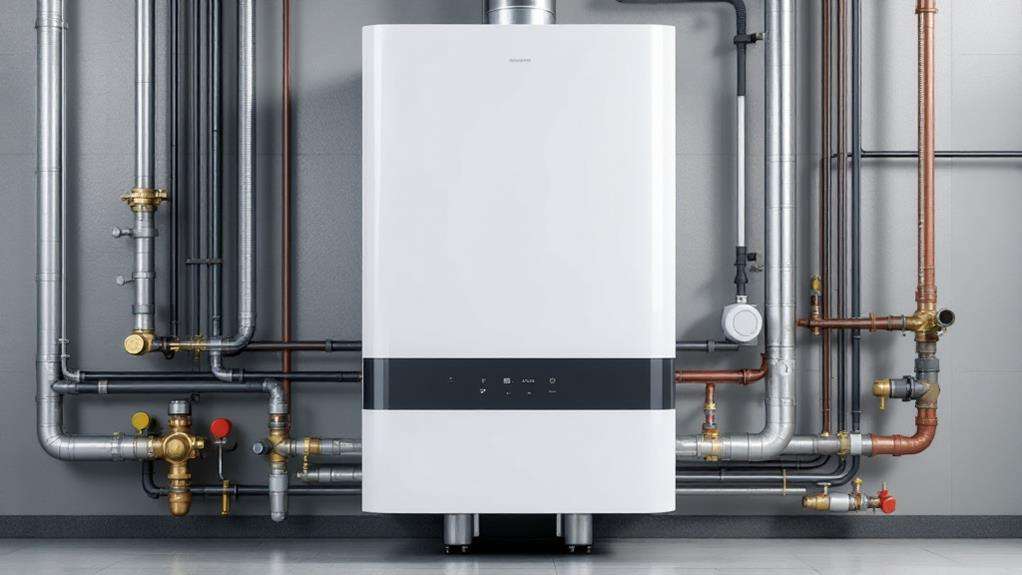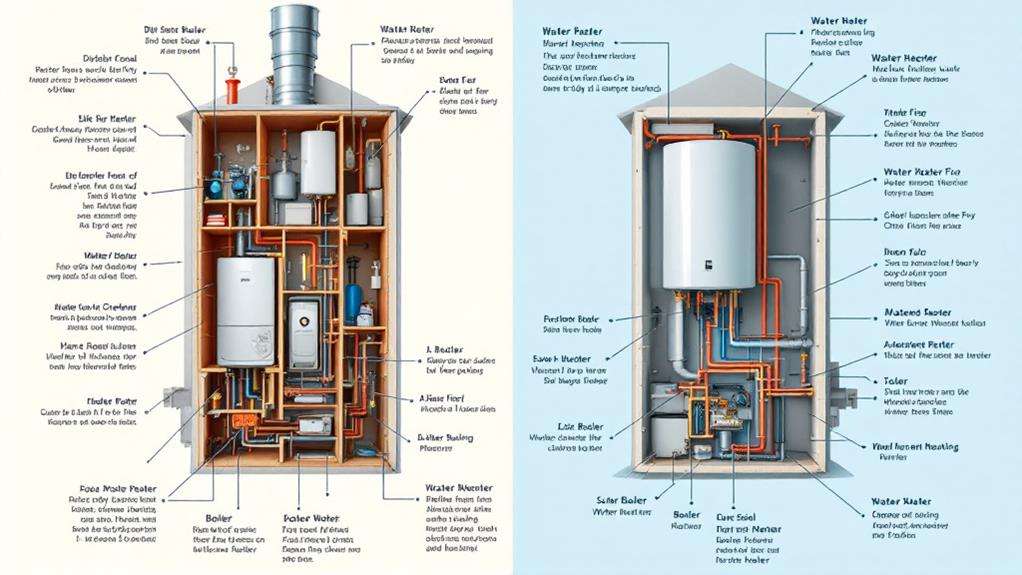Boiler vs. Water Heater: Which Heating System Is Right for You?
When choosing between a boiler system and a water heater for your home's heating needs, consider factors like energy efficiency, installation requirements, and your household's hot water usage. Boilers are more efficient for heating water and distributing it through pipes, while water heaters come in tank-style and tankless options with varying efficiency levels. Gas-powered models tend to be more efficient than electric. Think about your available space, ventilation needs, and typical hot water demands - these will help you determine the right heating system for your home. Dive deeper to discover how to find the perfect fit for your needs.
Key Takeaways
- Boilers heat water and distribute it through a network of pipes, while water heaters heat and store hot water on-demand.
- Boilers can be more energy-efficient, but have higher upfront costs, while water heaters may have lower installation expenses.
- Tankless water heaters are more energy-efficient than traditional tank-style models, but have a higher initial investment.
- The right choice depends on factors like available space, hot water usage, and fuel source (electricity, gas, or propane).
- Consider energy efficiency ratings, heating capacity, and maintenance requirements when selecting a boiler or water heater for your home.
Understanding Boiler Systems
A boiler system is a crucial component in many homes and buildings, responsible for heating water and distributing it through a network of pipes. These systems rely on various fuel sources, such as natural gas, oil, or electricity, to generate the heat needed to warm the water. Once the water is heated, it's then circulated throughout the building, providing warmth and comfort.
The thermostat settings on your boiler system allow you to control the temperature of the water, ensuring it's at a comfortable level. Boilers typically maintain a consistent temperature, unlike water heaters, which heat water on demand. This can make boiler systems more energy-efficient, as they don't have to work as hard to maintain the desired temperature.
Proper maintenance and regular servicing of your boiler system are essential to ensure it operates safely and efficiently. By understanding the inner workings of your boiler, you can make informed decisions about your home's heating needs and maximize the benefits of this reliable heating solution.
Exploring Water Heater Options
While boiler systems provide consistent heating for an entire building, water heaters offer a more targeted and on-demand solution for your home's hot water needs. Water heaters come in a variety of types, each with its own advantages. When exploring your options, consider the following:
- Tank Capacity: Water heaters come in different tank sizes, ranging from 30 to 80 gallons. Choose a capacity that aligns with your household's hot water usage to ensure you always have enough hot water on hand.
- Energy Efficiency: Look for water heaters with high energy efficiency ratings, like those with the ENERGY STAR® certification. This can help you save on your utility bills and reduce your carbon footprint.
- Fuel Type: Water heaters can be powered by electricity, natural gas, or propane. Evaluate the costs and availability of each fuel source in your area to determine the best option.
- Tankless or Traditional: Tankless water heaters heat water on-demand, while traditional models store hot water in a tank. Tankless systems can be more energy-efficient, but have a higher upfront cost.
Energy Efficiency Considerations

Energy efficiency is a crucial factor when selecting a water heater. It's important to consider your energy usage patterns and the environmental impact of your choice. Gas-powered water heaters tend to be more energy-efficient than electric models, but the efficiency can vary greatly depending on the age and model.
When evaluating energy efficiency, look at the Energy Factor (EF) rating. The higher the EF, the more efficient the water heater. Modern tankless water heaters often have EF ratings above 0.9, making them highly efficient. Traditional tank-style water heaters may have EF ratings as low as 0.5, so upgrading can significantly reduce your energy consumption and utility bills.
Additionally, consider the insulation quality and standby heat loss of the water heater. Well-insulated models lose less heat, further improving energy efficiency. By prioritizing energy efficiency, you can find a water heater that meets your hot water needs while minimizing your environmental impact and long-term energy costs.
Installation and Maintenance Factors
When installing a water heater, it's crucial to consider the space requirements and accessibility for maintenance. Unlike boilers, water heaters are typically standalone units that can be placed in a closet, basement, or other designated area. Fuel source considerations are also important, as you'll need to choose between electric, gas, or tankless water heaters based on your home's existing infrastructure.
Here are 4 key installation and maintenance factors to keep in mind:
- Retrofit requirements: If you're replacing an old water heater, you'll need to ensure the new unit fits the existing plumbing and electrical connections.
- Accessibility: Make sure the water heater is easily accessible for regular maintenance, such as flushing the tank or checking the anode rod.
- Ventilation: Gas-powered water heaters require proper ventilation to prevent carbon monoxide buildup.
- Tankless considerations: Tankless water heaters have specific installation requirements, including adequate power supply and proper venting.
Determining the Right Fit

Choosing the right water heater size is crucial to ensure it meets your household's hot water demands. Consider your room size requirements and heating capacity needs to determine the perfect fit. Measure the available space and choose a unit that won't overwhelm the area. If you have a large family or high hot water usage, opt for a higher-capacity model. On the other hand, a smaller household may only need a more compact water heater.
Assess your typical hot water usage, factoring in the number of bathrooms, appliances, and family members. This will help you select a system with sufficient heating power to keep up with your demands. Don't forget to account for energy efficiency, as a more energy-efficient model can save you money in the long run. With the right water heater size, you'll enjoy reliable hot water and optimal comfort in your home.
